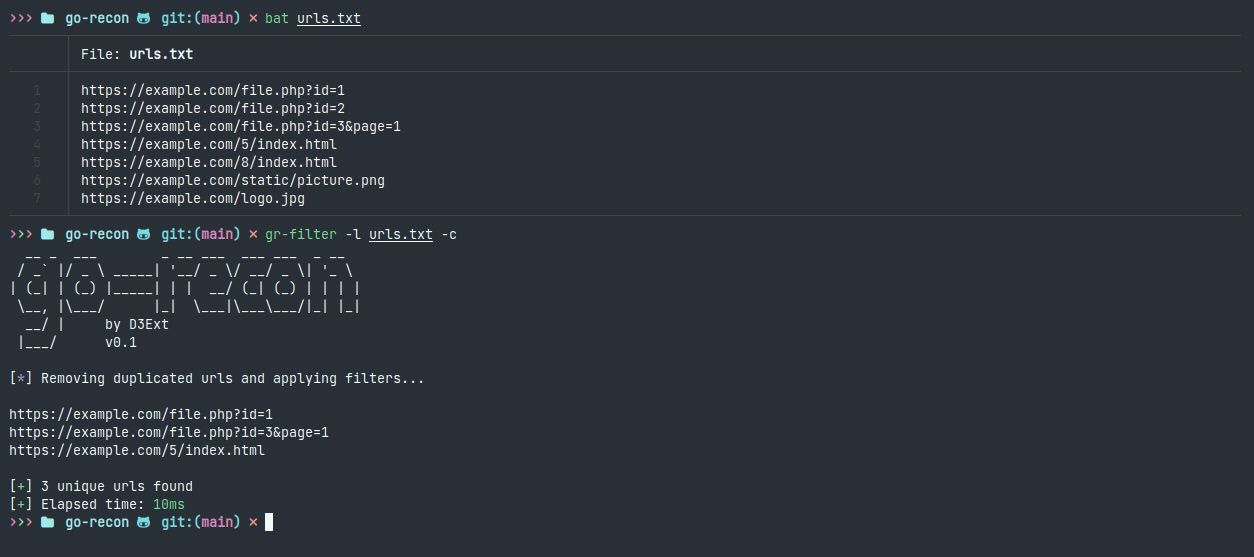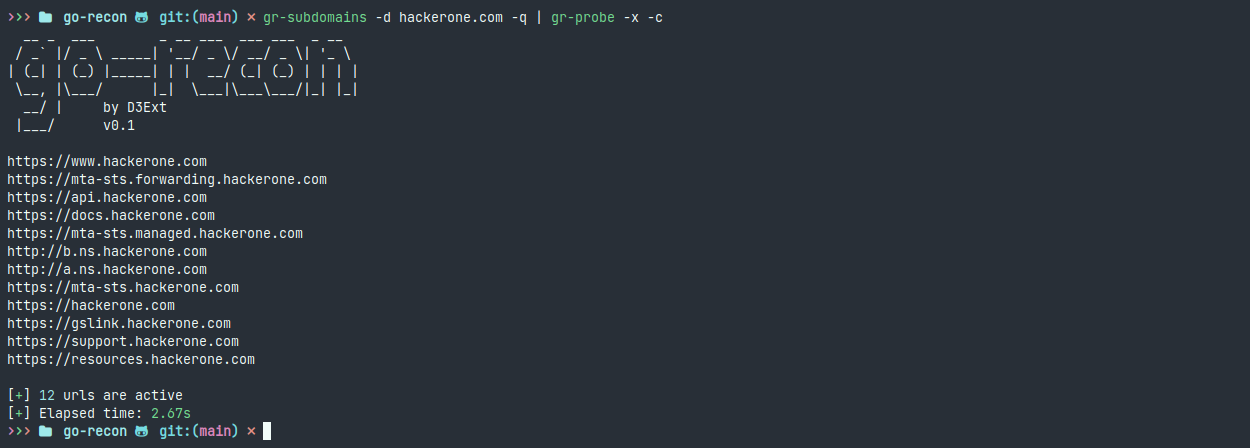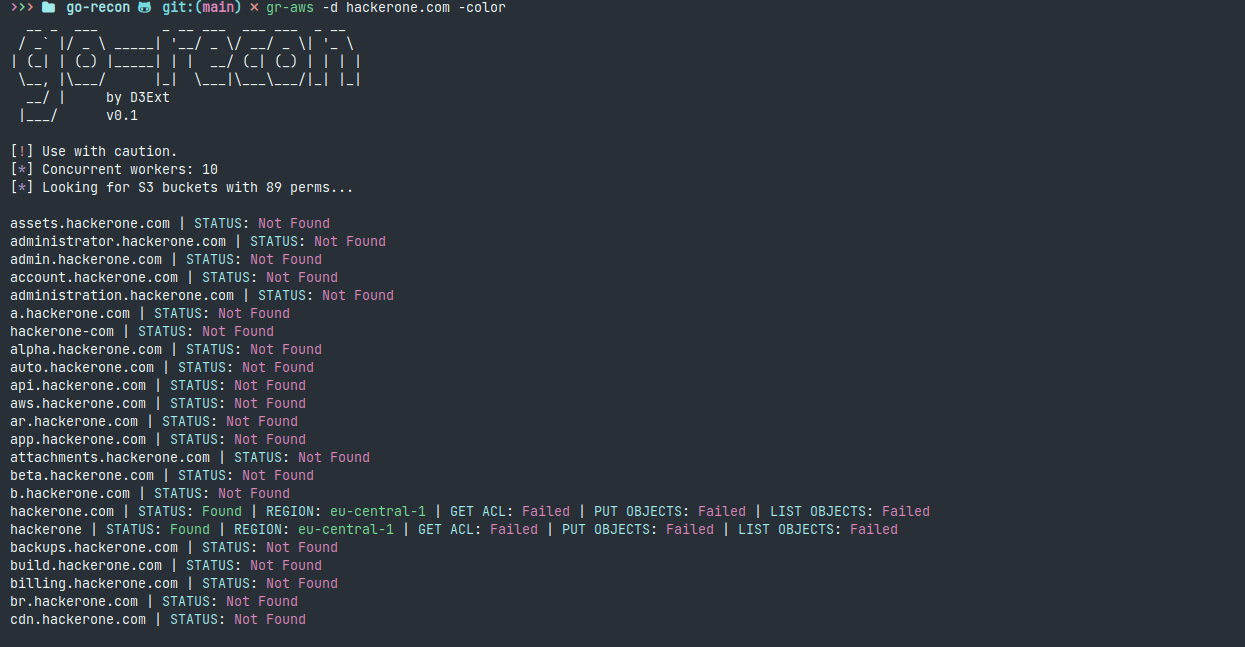https://github.com/d3ext/go-recon
External recon toolkit
https://github.com/d3ext/go-recon
bugbounty go-recon golang hacking recon toolkit
Last synced: 10 months ago
JSON representation
External recon toolkit
- Host: GitHub
- URL: https://github.com/d3ext/go-recon
- Owner: D3Ext
- License: mit
- Created: 2023-09-10T11:32:23.000Z (over 2 years ago)
- Default Branch: main
- Last Pushed: 2024-12-29T21:48:48.000Z (about 1 year ago)
- Last Synced: 2025-04-10T03:17:42.643Z (10 months ago)
- Topics: bugbounty, go-recon, golang, hacking, recon, toolkit
- Language: Go
- Homepage:
- Size: 3.69 MB
- Stars: 46
- Watchers: 2
- Forks: 6
- Open Issues: 5
-
Metadata Files:
- Readme: README.md
- License: LICENSE
- Code of conduct: CODE_OF_CONDUCT.md
Awesome Lists containing this project
README

go-recon
External recon toolkit
Introduction •
Tools •
Installation •
Usage
# Introduction
This project started as some Golang scripts to automatically perform tedious processes while performing external recon, between another bunch of things. Over the time I reworked the scripts and finally decided to create much more versatile tools, in this way I would also learn to use Golang channels and concurrency.
This toolkit provides tools for different purposes (enum and exploitation) while performing external recon. I also have to say that this project is not perfect and most of the available features are designed for bug bounty and that is why, for example, some tools only check the presence of vulnerabilities but does not exploit them. Most functions are also available and can be used through the official package API for your own tools. Feel free to contribute by reporting issues or discussing ideas.
# General Features
This are some of the most notable features of this suite:
- Speed and concurrency
- Easy and malleable usage via CLI arguments
- Tools are designed to be combined between them
- Designed for Bug Bounty and external recon
- Multiple output formats (STDOUT, TXT, JSON, CSV)
- Take input as CLI arguments or directly from STDIN
- Direct access to official package API
- Coded in Golang to provide the best performance
# Tools
Every tool starts with "gr" as acronym of ***GoRecon*** in order to distinct their names from other tools
- ***gr-subdomains***: Enumerate subdomains of a domain using 8 different providers (passively)
- ***gr-urls***: Find URLs (endpoints) of a domain from different sources (Wayback, AlienVault)
- ***gr-probe***: Probe active subdomains and URLs (http and https) fastly, with custom concurrency and more
- ***gr-403***: Try to bypass pages that return 403 status code (multiple techniques)
- ***gr-openredirects***: Fuzz for potential open redirects on given URLs using a payload/custom list of payloads
- ***gr-aws***: Enumerate S3 buckets for given domain using permutations, verify bucket lists and much more
- ***gr-waf***: Identify which WAF is running on target using multiple payloads
- ***gr-filter***: Remove useless URLs from list using inteligent filtering, create custom filter patterns
- ***gr-ssti***: Look for potential SSTI vulnerabilities on given URLs based on multiple engines payloads
- ***gr-replace***: Replace given keyword or parameter value with provided value from URLs of a list
- ***gr-secrets***: Search for API keys and leaked secrets in HTML and JS pages
- ***gr-crawl***: Fastly crawl urls for gathering URLs and JS endpoints, with custom depth and other config options
- ***gr-dns***: Retrieve DNS info from domains
- ***gr-whois***: Perform WHOIS query against domains
# Installation
Compile and install from source code via Github:
```sh
$ git clone https://github.com/D3Ext/go-recon
$ cd go-recon
$ make
$ sudo make install
```
The binaries will be compiled and installed on PATH, so you just will have to execute it from CLI
```sh
$ gr-subdomains
```
## Extra
To install a set of custom filters/patterns, you should execute the following command:
```sh
$ make extra
```
Then you can use them with `gr-filter`
# Usage
All tools have similar usage and CLI parameters to make recon easier
> Example help panel
```
__ _ ___ _ __ ___ ___ ___ _ __
/ _` |/ _ \ _____| '__/ _ \/ __/ _ \| '_ \
| (_| | (_) |_____| | | __/ (_| (_) | | | |
\__, |\___/ |_| \___|\___\___/|_| |_|
__/ | by D3Ext
|___/ v0.2
Usage of gr-subdomains:
INPUT:
-d, -domain string domain to find its subdomains (i.e. example.com)
-l, -list string file containing a list of domains to find their subdomains (one domain per line)
OUTPUT:
-o, -output string file to write subdomains into (TXT format)
-oj, -output-json string file to write subdomains into (JSON format)
-oc, -output-csv string file to write subdomains into (CSV format)
PROVIDERS:
-all use all available providers to discover subdomains (slower than default)
-p, -providers string[] providers to use for subdomain discovery (separated by comma)
-lp, -list-providers list available providers
CONFIG:
-proxy string proxy to send requests through (i.e. http://127.0.0.1:8080)
-t, -timeout int milliseconds to wait before each request timeout (default=5000)
-c, -color print colors on output
-q, -quiet print neither banner nor logging, only print output
DEBUG:
-version show go-recon version
-h, -help print help panel
Examples:
gr-subdomains -d example.com -o subdomains.txt -c
gr-subdomains -l domains.txt -p crt,hackertarget -t 8000
cat domain.txt | gr-subdomains -all -q
cat domain.txt | gr-subdomains -p anubis -oj subdomains.json -c
```
See [here](https://github.com/D3Ext/go-recon/blob/main/USAGE.md) for ideas and real examples about how to use ***go-recon*** for external reconnaisance
# Demo







# API
Install official ***go-recon*** Golang package like this:
```sh
$ go get github.com/D3Ext/go-recon/pkg/go-recon
```
If you want to use ***go-recon*** in your own Golang code see [here](https://github.com/D3Ext/go-recon/tree/main/examples)
# Additional Resources
This project also contains a set of diverse resources under `utils/` that may be useful for web exploitation and bug bounty. For example, the WAF vendors information in JSON format which is directly used by `gr-waf` to identify them.
There also are a few lists of payloads for different vulnerabilities such as XSS, SQLi or LFI.
Moreover, you could find some already vulnerable web pages that you can directly run to test the different vulnerabilities by your own. Most of the templates are extremely simple but effective
There also is a Bash script (`go-recon.sh`) which leverages most of the features this project provides in order to automate a great part of the external recon process against a domain.
# TODO
- ~~More tools and features~~
- Add parameter to add custom POST data
- Email accounts enumeration
- ~Custom headers support (only on tools that send requests directly to the target)~
- ~Little fixes~
- ~CSV output supported by default on every tool~
- ~CLI parameter to configure custom user agents~
- ~More filtering patterns~
- ~More vulnerabilities payloads~
- ~WAF detection improved~
# References
Inspired and motivated by some awesome tools like this:
```
https://github.com/lc/gau
https://github.com/lc/subjs
https://github.com/tomnomnom/httprobe
https://github.com/projectdiscovery/subfinder
https://github.com/tomnomnom/waybackurls
https://github.com/projectdiscovery/nuclei
https://github.com/tomnomnom/qsreplace
https://github.com/hakluke/hakrawler
https://github.com/gocolly/colly/
https://github.com/d3mondev/puredns
https://github.com/blacklanternsecurity/bbot
https://github.com/s0md3v/uro
https://github.com/nytr0gen/deduplicate
https://github.com/smaranchand/bucky
https://github.com/projectdiscovery/interactsh
https://github.com/swisskyrepo/PayloadsAllTheThings
https://github.com/1ndianl33t/Gf-Patterns
https://github.com/r3curs1v3-pr0xy/sub404
https://github.com/devanshbatham/ParamSpider
https://github.com/m4ll0k/SecretFinder
https://github.com/MrEmpy/mantra
https://github.com/iamj0ker/bypass-403
https://github.com/edoardottt/favirecon
https://github.com/hueristiq/xs3scann3r
```
# License
This project is under MIT license
Copyright © 2025, *D3Ext*


